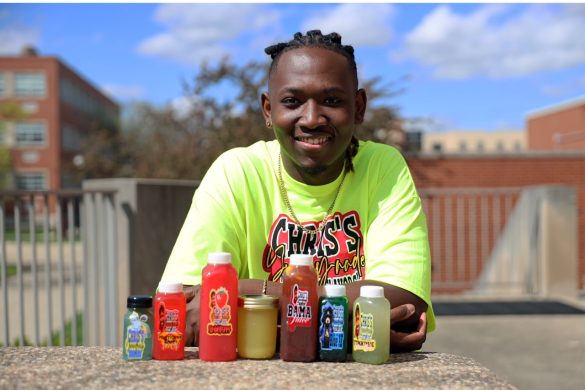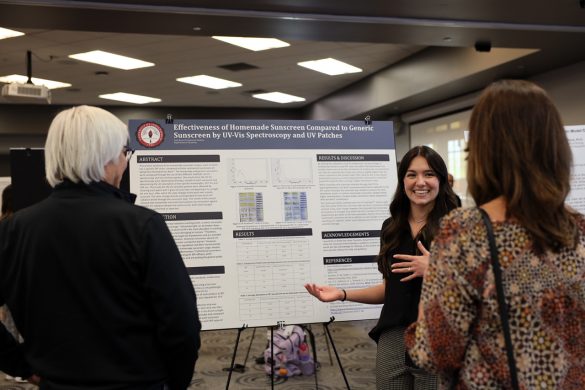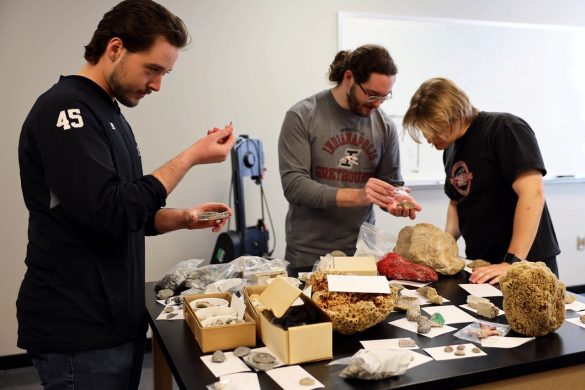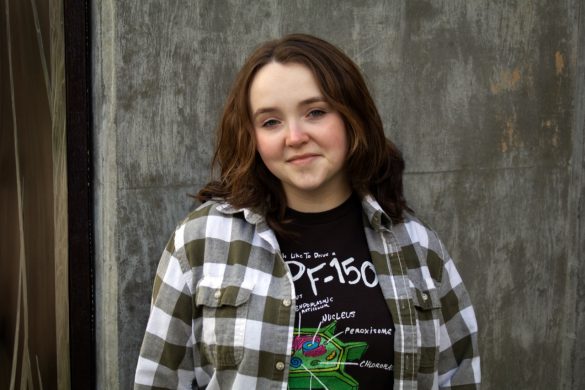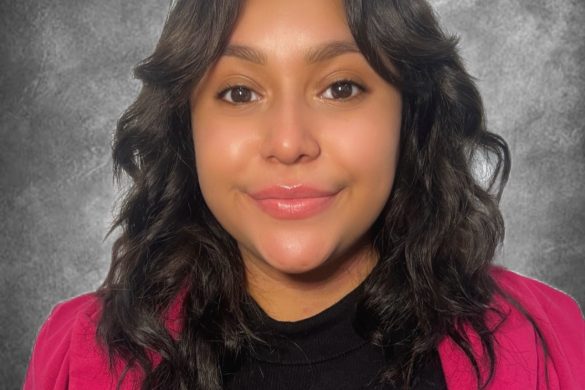Most people experience heartbreak, but they all experience it differently. University of Indianapolis alumnus Dalton Herendeen experienced it on a worldwide stage. In 2012, he traveled to London to compete in the Paralympics, but he did not make it to the finals in any of his events.
In 2016, Herendeen made the trip to Rio. Unlike in 2012, he moved on to the finals in three of his five races, but most importantly he moved on in the 100-meter breaststroke. It was the reason he was able to go to Rio; it was also the reason for his heartbreak.
“I swam the 100-meter breaststroke on the 14 [of September] and made it back to finals in that event. And I swam it, and I got fourth by .27 [seconds]. That was pretty heartbreaking to be honest,” he said. “That was a hard day for me because you train your whole life and give it everything you have for that one event, and to get fourth by .2, that really hurts…. After that event, I went back to the cool down pool, and I just lost it emotionally, because it’s over in a split of a second.”
Herendeen said he had mixed emotions about finishing fourth, because it was the best time he had ever swum.
“It was a damn good race, and I was so proud. But at the same time, when you come so close, it hurts so bad,” he said. “But to get fourth and to say I’m the fourth fastest in the world is pretty awesome.”
While in Rio, Herendeen also swam in four other events: the 200 IM, 100 fly, 400 free and the medley relay. Looking back at the experience as a whole, despite not medaling, Herendeen says that his favorite memory is the 100-meter breaststroke.
“That was awesome,” he said. “To get up there in front of the crowd… You can’t even hear yourself think, it’s so loud in the building. People are screaming, and you know you’re sitting up there, and you can feel your own heart beat. And you get up behind those blocks, and you know this is the event you’ve trained for for four years, and this is it. It’s do or die, and you jump in. And I just remember feeling the water. I just remember, I was out really quick … but I got caught at the very end, I got tired. It was pretty cool and the announcers they were yelling my name. I don’t know, that moment, that 100-meter breaststroke, I’ll remember that moment for the rest of my life. And then to touch up and look up at the scoreboard to see that I missed medaling, because I’ve trained my whole life to try to medal, and to know I missed my medaling by .2 … to look up and know that I came so close. I worked my ass off, so I’m pretty happy about that.”
He said that his most significant takeaway from Rio is that you can do everything right, but sometimes it is not meant to be.
“I think for me to get fourth by .2 definitely made me realize that you could give it everything you have, you could work hard, you could do everything right, but sometimes you don’t succeed. I think that’s definitely a really cool story with me,” Herendeen said. “I did everything right and I made these changes and I swam so fast and I went all best times. But sometimes it’s not enough, and sometimes you don’t succeed. I think to understand that and to know it kind of re-humbles me and makes me understand a little bit more that maybe it’s not meant to be. There’s something bigger out there I guess, but I think that’s my biggest take away.”
Prior to graduating from UIndy, Herendeen met University of Mary Washington Head Swimming Coach Abby Brethauer at a swim camp. Following various conversations about what he was doing after graduation and whether or not he wanted to go into coaching or training for Rio, or both, Brethauer was able to offer Herendeen a job and a training opportunity.
Brethauer said that deciding to train and work together was never a “let’s do this” situation, but various conversations that led to that opportunity. Herendeen visited Mary Washington in the fall of his senior year to get a feel for the team, the campus and the area.
After graduating in 2015, Herendeen moved to Virginia to become an assistant coach at Mary Washington. Brethauer said that working with him has helped her grow and step outside of the box as a coach.
“He’s great,” Brethauer said. “He’s super high energy, [and the] kids love him—having him around makes our whole team better. So that’s a huge bonus side of coaching [with him].
“And then being able to work with him the last year as an athlete has just been, for me, a huge growing experience. It’s really nice to have someone who is talented and understands his body and who’s also willing to try new things. He allowed me to grow as a coach and step out of my box…. We’ve spent every day together for the last 12 months. So having him gone in Rio, while very fun and exciting to watch, I felt very empty without him, because we’ve spent so much time together. But I’m very glad that he is back.”
Herendeen said that without Brethauer, Rio would not have been possible.
“She’s been behind me single every day,” he said. “She’s been my biggest cheerleader. She’s been my biggest motivation and my biggest help and my biggest support. I would be nowhere without her. I would definitely say I owe everything to her.”
Leading up to Rio, Herendeen was coaching, swimming six to 10 workouts and lifting three to five times a week.
“It was crazy,” Brethauer said. “When we were in season with the team, he would swim with the team. And then he would coach a group. And then he would go lift on his own. And then he’d come back in the afternoon and swim…. It was a schedule that didn’t leave much time for him to do anything else other than work and train, and it was one where every minute was taken up…. Once the team finished [the season], it was a lot of one-on-one time. It was a lot of Dalton doing really hard work and me watching him doing it from February to trials.”
After going to trials and making the team, Brethauer said that Herendeen did most of his training on his own. Herendeen was competing against athletes who were devoting everything to swimming, while he was dedicating his life to coaching and swimming. Brethauer said he was working a full-time job, but not a typical 40-hour week, rather 60 to 80 hours a week as a coach in addition to all of his training.
As Herendeen left for Rio, Brethauer said she had tears in her eyes. Fortunately, the two were in constant contact through phone calls and text messages. Later, the tears came back for Brethauer as Herendeen touched the wall in the 100-meter breaststroke.
“I mean this with no disrespect to the 15 years of coaching that I’ve done at the collegiate level, but watching him swim was the proudest moment of my coaching career. When I said goodbye to him before he left, I was in tears and just so proud of him and the work that he’s done and knowing that it wasn’t easy. He had knee surgery in November. He only has one good knee, so having knee surgery is kind of a big deal…. And to be able to make a comeback from that is insane. And to qualify … I was just so proud, seeing him smile, seeing him so happy…. Watching him come in fourth, I cried because I was so proud of him, and I cried because I was so heartbroken for him, because I know how hard he worked.”
Brethauer wanted Herendeen to medal to have something to represent all of the effort he had put into being a Paralympian.
“A medal is something you can show to people who don’t understand what you do,” she said. “Because I think people who don’t understand, their first question is, ‘Oh, did you medal?’ And I wanted that for him so badly, because it doesn’t make any difference to me or the people that know him and love him, because we know what he’s done. But that way, when people ask, ‘Oh did you win a medal?’… you can say ‘Yes,’ [and] that’s huge.”
While Herendeen is proud to represent his country, Brethauer is proud to work beside him, because of his positive outlook. Herendeen not only has exposed Brethauer to the para-world, but has exposed his swimmers to the para-world and to the fact that para-swimmers can be just as successful as able-bodied swimmers.
“I think one of the best things about knowing Dalton in terms of a wider life view [is that] first off he’s the most positive person you’ll ever meet,” Brethauer said. “He’s excited, and he’s passionate, and it takes a lot to get him down. When he is around you, he forces you to become better, because his personality is insanely positive, which I find rare these days…. [He] has opened my eyes to a whole different side of my sport that I didn’t know existed in the para-world. And so like going to trials with him and seeing some of the other swimmers that he was competing against and just kind of getting an idea of all that stuff, it really opened my mind … A disability is not something that has to be a negative. Unless you’re in contact with that, you don’t really realize it on the same level…. I have my feet wet in the para-world, and I’m recruiting other para-athletes, and it’s awesome. It’s a whole new side to the sport that has been opened up. And seeing his enthusiasm and meeting these people—it’s such as unique experience that I feel very fortunate to have been a part of, and to have now, going forward, as part of my coaching career. And I’m very excited about staying involved with that.”
Not many people get to say they have experienced the Olympics, let alone competed, but Herendeen has had that opportunity twice. He’s been a part of the opening ceremonies. He has met people from all over. He has lived in the Olympic Village. And he represented the United States.
“I’m so lucky and so honored and so privileged to get to represent my country. It is incredible, absolutely a feeling [I’ll never forget]. And you get to walk up there in the blocks and represent your country, and it’s just like … I can’t explain to you what it means. And all this stuff, it’s just absolutely incredible to be an Olympian, twice now. It is awesome.”
